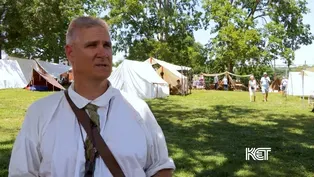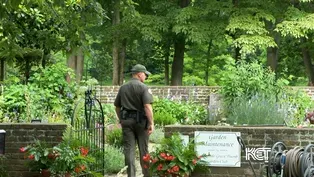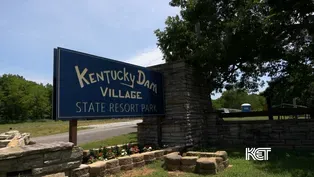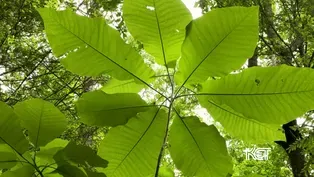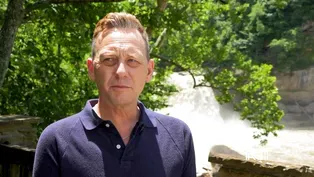
Preserving Cherokee State Park
Clip: Season 3 Episode 25 | 5m 14sVideo has Closed Captions
Cherokee State Park was the state's first, and only, park for African Americans.
Opened in 1951, Cherokee State Park was one of only six open to African Americans in the U.S. during the Jim Crow Era. It closed in 1964. Now there are efforts to preserve the park and its history.
Problems with Closed Captions? Closed Captioning Feedback
Problems with Closed Captions? Closed Captioning Feedback
Kentucky Edition is a local public television program presented by KET

Preserving Cherokee State Park
Clip: Season 3 Episode 25 | 5m 14sVideo has Closed Captions
Opened in 1951, Cherokee State Park was one of only six open to African Americans in the U.S. during the Jim Crow Era. It closed in 1964. Now there are efforts to preserve the park and its history.
Problems with Closed Captions? Closed Captioning Feedback
How to Watch Kentucky Edition
Kentucky Edition is available to stream on pbs.org and the free PBS App, available on iPhone, Apple TV, Android TV, Android smartphones, Amazon Fire TV, Amazon Fire Tablet, Roku, Samsung Smart TV, and Vizio.
Providing Support for PBS.org
Learn Moreabout PBS online sponsorshipKentucky State Park took its place in history when it opened in 1951.
Located adjacent to the whites only kin like State Park Cherokee State Park was the state's first and only park for African-Americans.
It was also one of only six open to African-Americans in the U.S. during the Jim Crow era, making it a popular vacation spot for African-Americans until it closed in 1964 when segregation was outlawed.
Now there are efforts to preserve the park and its history.
The very nature that they had this park was progress, but the very nature that they had to have it is a conflict, meaning the very nature the blacks and whites could not enjoy outdoors together.
That's a conflict.
I received a grant from the National Historic African-American Fund National Historical Trust.
And so to fund the grant was to do something to promote the park.
And so what I realized is that people didn't know about the park.
They didn't know where it was even coming sides.
They didn't know how to do it.
They didn't know the history.
So I felt a movie was necessary to communicate to people what it was about.
If you look at where this park yields and look away, Kinloch is is literally segregated.
Kinloch is over there, you Cherokees over here.
And that's how it was in those days.
One world was one place while the white world was one place and the black world was another place.
So this park is symbolic of that.
The rules that they used to develop segregated parks, they used at all the park.
So which meant that most of the time all of the facilities were in one area.
And then the segregated park was very far away from from everything else.
And so for me, when I would first go out to Cherokee, I would think to myself, it's such a beautiful, amazing spot.
You're right on the water.
It's very secluded and nice.
And then through my education of the process and everything that went through, making segregated parks, I realized that that was that was intentional, that that wasn't like, hey, this is a beautiful spot.
It was more of.
Where can we do something other way?
And the park was a place where African-Americans in Kentucky could come when they couldn't come to no other places.
In other words, you couldn't participate in activities in state, other state parks at that time.
And see this the first they said the poor first state segregated park in the south.
The black facility was a mirror of the white for so many.
It was all the things that the white park here.
So down here, they had a lot.
They had a beach, everything.
They had the whites, the hill down here.
They came down here for family units, private parties.
So it was a it was a hotspot.
But that everybody all kind of classes came.
That was special because in those segregation days, it was no room just for the classes to separate.
So they had to come together.
So Cherokee was a place for that to happen.
Unfortunately, I don't feel like a lot of people that become aware of the park or that that portion of can like State Park are really aware of the history.
Nobody, nobody wanted to preserve that information in that history.
And so it's very unique for us to have the the last of our historic Cherokee Park here on site.
It's been proposed, you know, to and working with the French group.
And we're trying to get to a position where it could be a more of an education outreach focused area to where it would have self interpretive sites, signage and, you know, with pictures and information to where when you go there, you can actually learn a little bit more.
See right now is you come out here, you enjoy all the beauty because it's beautiful.
I mean, actually the scenery is gorgeous, but they don't understand the context.
Many of them are too young to understand it, and the older ones don't want to talk about it.
So it needs to be contextualized for the people so they can understand.
So Kentucky can understand its role in segregation.
That's important.
And I know it's not something for you to get angry about.
It's something for people to celebrate.
Now.
Cherokee State Park was recognized with a listing on the National Register of Historic Places in 2009.
You can find out more about the park and efforts to preserve it by going to friends of Cherokee State Historic Park.
Dot o RG.
Video has Closed Captions
Keeping Old Fort Harrod's historical footprint intact. (2m 50s)
Video has Closed Captions
These park rangers have a passion for Kentucky's state parks. (2m 53s)
Video has Closed Captions
A state park in Western Kentucky is employing people in need of a second chance. (2m 53s)
Video has Closed Captions
Pine Mountain State Park is often referred to as Kentucky's first state park. (3m 53s)
Writing Workshops at State Parks
Video has Closed Captions
Kentucky Powet Laureate Silas House is hosting writing workshops at state parks. (5m 33s)
Providing Support for PBS.org
Learn Moreabout PBS online sponsorshipSupport for PBS provided by:
Kentucky Edition is a local public television program presented by KET
